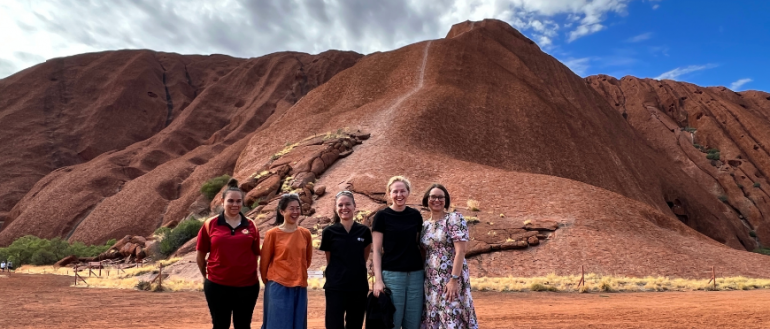Funder:
- Menzies Small Grants
Collaborator:
- Imperial College, London
Aim:
The PROLIFICA-NT project – Prevention of Liver Fibrosis and Cancer Australia – Northern Territory aims to provide initial validation and demonstrate the feasibility of using a urinary metabolite screening assay for hepatocellular carcinoma in remote Aboriginal communities.
Objectives:
To validate and adapt if necessary a metabolite panel for use in a urinary screening test within the Australian population. Participants will provide a urine and blood sample and dietary information and undergo ultrasound and fibroscan. There will be a mix of healthy controls, patients with hepatocellular carcinoma and Hep B infected individuals with and without cirrhosis (scarring) fo the liver .
Summary:
We have determined that Aboriginal populations have a six times higher incidence of hepatocellular carcinoma (HCC) compared to non-Aboriginal Australians in the Northern Territory (NT). Screening for HCC currently consists of a liver ultrasound and a blood test for a tumour marker every 6 months. Picking up HCC early when curative treatments are available is logistically challenging in the NT setting. This study will establish if a urine test, looking for specific urinary metabolites to screen for HCC is possible and can provide clinically useful results in Aboriginal people living in remote communities. The collaborating Imperial college has already successfully pioneered the use of urinary metabolomics for this purpose in the Gambia.
Implications for policy and practice:
This project will find an enduring solution to a health problem that matters – i.e. enable Aboriginal Australians living in the remote NT setting to have access to regular HCC screening which is part of internationally recommended evidence based guidelines. It will eliminate some of the logistical challenges faced in a remote tropical setting for a common problem that has significant mortality associated with it.
Our research has found:
Preliminary results show that it is logistically possible to collect urine samples in a remote NT community and transport firstly to Darwin and then to London. Early results suggest the models being used are predictive.
Chief Investigator:
Project manager:
Contact information:
Project dates:
The project commenced in 2016 and is ongoing.
-
Davies J, Boutlis CS, Marshall CS, Tong SYC, Davis JS. The unique aspects of chronic hepatitis B infection in Aboriginal and Torres Strait Islander people. Internal Medicine Journal 48 (2018) 484-485
-
Cheah BC, Davies J, Singh GR, Wood N, Jackson K, Littlejohn M, Davison B, McIntyre P, Locarnini S, Davis JS, Tong SYC. Sub-optimal protection against past hepatitis B virus infection where subtype mismatch exists between vaccine and circulating viral genotype in northern Australia. Vaccine 36 (2018) 3533-3540
-
Davies J, Qin Li S, Tong SYC, Baird RW, Beaman M, Higgins G, Cowie BC, Condon JR, Davis JS. Establishing contemporary trends in hepatitis B sero-epidemiology in an Indigenous population. PLoS ONE 12(9) 2017.
-
Davies J, Bukulatjpi S, Sharma S, Caldwell L, Johnston V, Davis J. Development of a Culturally Appropriate Bilingual Electronic App About Hepatitis B for Indigenous Australians: Towards Shared Understandings. 2015;4:e70.
-
Littlejohn M, Davies J, Yuen L, Tong S, Davis JS, Locarnini S. Molecular virology of Hepatitis B virus, subgenotype C4 in Northern Australian Indigenous populations. Journal of Medical Virology 2014; 86: 695-706
-
Davies J, Bukulatjpi S, Sharma S, Davis J, Johnston V. “Only your blood can tell the story” – a qualitative research study using semi-structured interviews to explore the hepatitis B related knowledge, perceptions and experiences of remote dwelling Indigenous Australians and their health care providers in northern Australia. BMC Public Health 2014, 14:1233
-
Parker C, Tong SYC, Dempsey K, Condon J, Sharma S, Chen JWC, Sievert W, Davis JS. Hepatocellular carcinoma in Australia’s Northern Territory – high incidence and poor outcomes. Medical Journal of Australia 2014; 201(8): 470-47.
-
Davies J, Littlejohn M, Locarnini SA, Whiting S, Hajkowicz K, Cowie BC, Bowden DS, Tong SYC, Davis JS. The molecular epidemiology of hepatitis B in the Indigenous people of northern Australia. Journal of Gastroenterology and Hepatology 2013; 28(7): 1234-1241.

